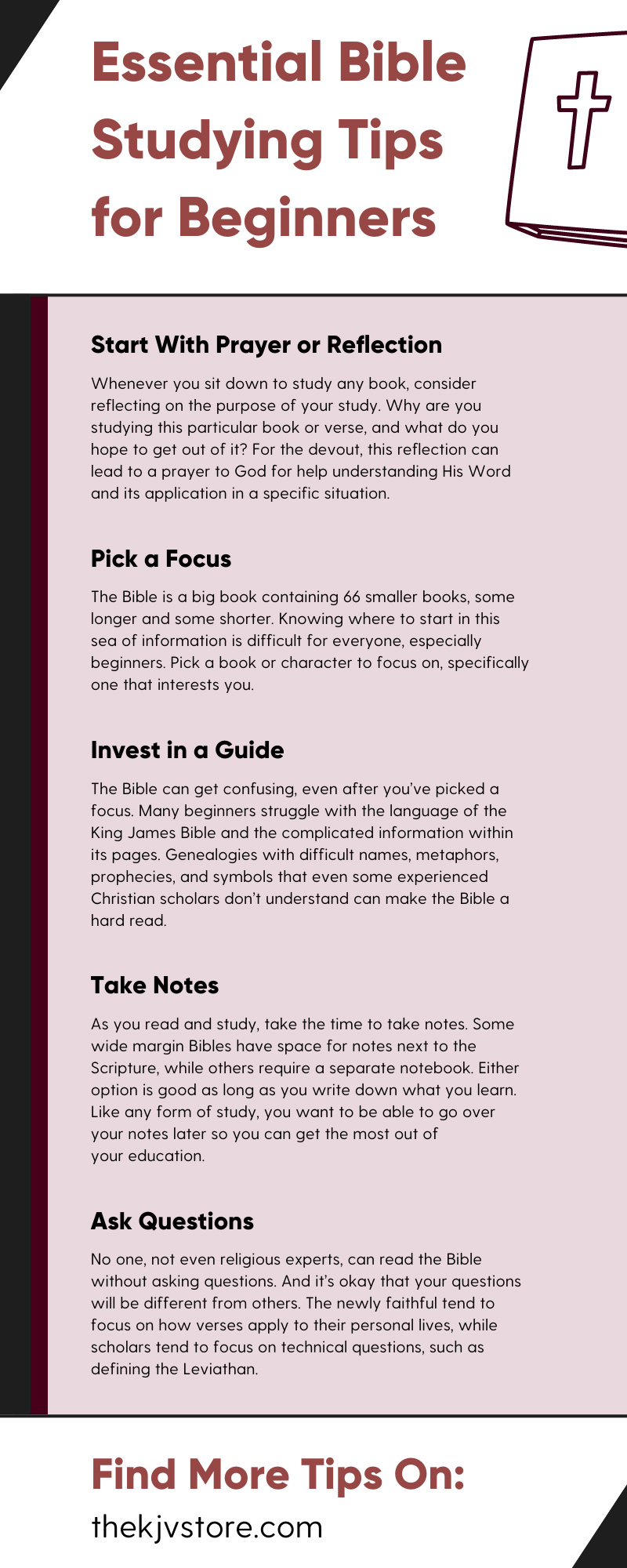10 Essential Bible Studying Tips for Beginners

Religious literature is a fascinating subject that captures many people. The faithful love their religious books and read them regularly to grow in their faith. Others, such as scholars and philosophers, read religious literature for more intellectual reasons. Religious books, such as the Bible, are important regardless of why people read them. Reading and studying the Bible can feel intimidating, especially for someone who has never read it. Keep reading to learn about ten essential Bible-studying tips for beginners so you know how to start and follow through.
Start With Prayer or Reflection
Whenever you sit down to study any book, consider reflecting on the purpose of your study. Why are you studying this particular book or verse, and what do you hope to get out of it? For the devout, this reflection can lead to a prayer to God for help understanding His Word and its application in a specific situation.
If you’re reading the Bible for other reasons, you can stay in that reflective state as you prepare to start your study. While you may not have personal reverence for the book, acknowledging its importance and what you want to gain from it is a good first step in the study process.
Pick a Focus
The Bible is a big book containing 66 smaller books, some longer and some shorter. Knowing where to start in this sea of information is difficult for everyone, especially beginners. Pick a book or character to focus on, specifically one that interests you. Once you’ve studied your first interest, you can move on to a second or start reading chronologically.
Invest in a Guide
The Bible can get confusing, even after you’ve picked a focus. Many beginners struggle with the language of the King James Bible and the complicated information within its pages. Genealogies with difficult names, metaphors, prophecies, and symbols that even some experienced Christian scholars don’t understand can make the Bible a hard read.
If you’re struggling, consider buying a Bible study guide or downloading an app with study guides. Experts write these guides to help people of all levels understand the Bible better, and you can greatly benefit from their insight.
Take Notes
As you read and study, take the time to take notes. Some wide margin Bibles have space for notes next to the Scripture, while others require a separate notebook. Either option is good as long as you write down what you learn. Like any form of study, you want to be able to go over your notes later so you can get the most out of your education. Notetaking, in your Bible or a notebook, allows you to do that. While some people balk at the idea of writing in any book, especially a holy one, this is a great way to keep your notes and the subject matter close together for easy access.
Ask Questions
No one, not even religious experts, can read the Bible without asking questions. And it’s okay that your questions will be different from others. The newly faithful tend to focus on how verses apply to their personal lives, while scholars tend to focus on technical questions, such as defining the Leviathan.
Regardless, writing down your questions will help you remember what they are so you can easily search for an answer. Leave a spot for the answer, so you can review the question-answer pair when desired.
Find an Expert
Many times, the Bible answers its own questions. They might take time to find, but you’ll eventually get there. Some questions are harder to find the answer to, though, even with the help of a Bible study guide. This is when you can lean on an expert for answers.
If your professor has assigned this Bible study to you, go to them with questions. If this is a study you’ve started yourself, go to someone you know and trust who’s been studying the Bible longer than you. For some, a family member or trusted professional, such as a pastor, can shed more light on the subject. There’s no shame in seeking help with your questions, so find an expert and carve out the time to sit down with them.
Join a Group
As you consider your questions and what you’re learning during your Bible study, you may discover you need the advice of multiple experts—sometimes, you just need someone to talk to. Study groups can offer that camaraderie and assistance, so consider joining one in your area.
Many churches and parachurch organizations have Bible studies that meet at various times, so you can find a group that works for you. If you’re strictly studying the Bible for scholarly or philosophical reasons, you can probably find a group on your college campus or through a local library.
Do Research
If you’d prefer to keep your questions or studies to yourself, that’s okay. The internet and library are great research resources that can help you find the answers you’re looking for. Have your questions ready, and consider searching various versions of them so you can find the related sources that will help you the most. If you’re struggling to find related research to your questions or the topic you’re studying, ask a librarian or cast a wider net in your virtual search. Eventually, you’ll find a good starting point.
Make a Schedule
Studying takes self-discipline, so if you want to study well and learn, you need to make it a part of your regular schedule. Everyone’s schedules look different, so don’t stress that someone else has more time to study than you do. Just find a time that works for you and be consistent. Consistency will help you study even when you don’t feel like it, which is good for whatever reason you started studying in the first place.
Keep Going
Keeping up with a regular study schedule for any book or class is hard, but just because something is hard doesn’t mean you should give up. If you’re starting to slip out of your Bible study schedule, remind yourself why you’re doing it in the first place. Getting closer to God, understanding organized religion better, or getting a good grade in a class is worth the effort. No matter how you feel, keep going.
Studying the Bible as a beginner is hard, but with these essential study tips, you’ll get a little bit closer to understanding this important, complicated book. Never lose sight of why you started studying or what you want to learn. You can grow in your faith and your studies with the right motivation.

